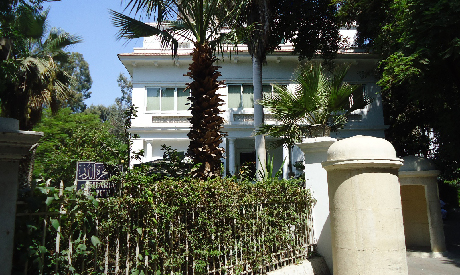
White villa housing the Ministry of Culture, Zamalek, Cairo
Prior to the January 25 Revolution, police and army officers were often appointed to positions in the fields of art and culture. However, artists hoped the revolution would end the practice of employing people in a field which deserves to be run by appropriately qualified personnel. Unfortunately, it seems this is still far from being a reality.
One of the most puzzling events was the appointment of police officer Hassan Abdel Tawab Khallaf to a position in the Head of the Minister of Culture’s office. Khallaf was placed in the ministry shortly after Emad Abu-Ghazi became the Minister of Culture. According to sources within the ministry, Major Khallaf’s résumé includes a postgraduate diploma in criminology, working for the Central Security Forces in the 1980s, appointments in the Ministry of Culture’s Book Archive (Dar El Kotob) and the Ministry of Finance. His recent return to the Ministry of Culture is one of the crucial disappointments expressed by artists.
Many artists and people working in culture expressed their objections on Facebook and Twitter, where we read statements such as, “Is graduation from police or military college a requirement for managing an office in the Minister of Culture?”
To the art world, Khallaf is just a small example that the regime, targeted by the January 25 Revolution, is far from being diluted.
Mohamed Hassane, a scriptwriter, says the appointment testifies to “a clear disharmony between the ministry role and the choice of its employees, something that was practised by the old regime.”
The appointment of the police officer to the ministry is not the only issue troubling artists. “It is obvious that the revolution has not reached the art scene,” Hassane says.
One of the known examples of “disharmony” is General Samir Farag who, in the early 2000s, was appointed Head of the Cairo Opera House, a position which he left following his assignment as governor of Luxor. At that time, the Cairo Opera House already had many officers on board, so Farag's appointment only added to the number. According to a source within the Opera House administration, many administrative positions within cultural institutions are still filled by army officers.
Hassane explains that prior to the January 25 Revolution, placing army or police officers in cultural institutions served one of two purposes: either to place strong governmental influence on those institutions or as a reward for officers approaching the age of retirement because jobs in culture were considered easy.
“If they are looking for administrative experience in their appointed officers, why doesn’t the Ministry of Culture contact graduates from the business of administration or other more relevant faculties? What is the relation between a police officer and poetry, paintings or film production?” Hassane asks.
Omar El-Fayoumy, a renowned Egyptian painter remarks: “I have a deep respect for Abu Ghazi as a friend and man of culture, yet I am deeply surprised by some of his decisions. On the other hand there is not sufficient dynamism regarding many pressing issues in the arts... If Abu Ghazi is not capable of facing pressure, maybe it would be better for him to resign.”
Hamdy Reda, founder and director of the Artellewa Cultural Centre, blames the minister himself, calling the appointment of the police officer “proof of the minister’s dictatorship.” Reda recalls the minister’s interference in this year’s Youth Salon, planned for October. The Youth Salon committee headed by Dr. Mohamed Shaker, former dean of the Faculty of Fine Arts at Alexandria University, has independence when choosing participating artists, structuring the jury and distributing awards.
This year, the committee has opened its doors to all young artists without exception, looking forward to contributions that would reflect on the revolution. But the ministry has opposed the committee’s independence. “By interfering with decisions of the Salon’s high committee, Abu Ghazi sets a clear censorship on arts,” Reda comments, adding that the ministry overturned some of the committee’s decisions and as a response, committee members have submitted their resignation.
All interviewed artists underlined their respect for Abu Ghazi and recognised his previous achievements. However, they also expressed concern regarding many decisions made by the ministry. The appointment of a police officer to such a crucial position is seen by artists as proof that the old regime is still controlling the Ministry of Culture. Ironically, a number of employees working within the ministry, who had hoped to see change, are equally dissatisfied with the police officer’s appointment. Some of them not only oppose the general concept, seen by Hassane as being disharmonious, but also add that this specific appointment has brought with it various internal problems.
Short link: